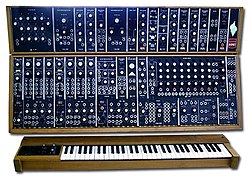Composition

AllMusic critic Tom Maginnis, wrote that "Strange Days" seems to find Jim Morrison "pondering the state of the then emerging hippie youth culture and how they are perceived by mainstream or 'straight' society". [3] The song's lyrics, accordingly to Maginnis, were inspired following a visitation of the Doors in New York City. [3] Music Journalist Stephen Davis noted that Morrison's lyrics have an "emotionally raw tone" on the song. [4]
The track is known for its distinctive usage of the Moog synthesizer, which was made available the same year of the song's recording. In the Doors' biography No One Here Gets Out Alive , authors Danny Sugerman and Jerry Hopkins, described "Strange Days" as "one of the earliest examples of the Moog synthesizer in rock". [5] The synth was provided by Jim Morrison to filter his vocals by playing notes, and it was hooked up with the help of Paul Beaver. [6] Doors' engineer Bruce Botnick recalled the instrument's contribution:
We created an envelope where we could feed Jim's track into the Moog so that he could play any note on the keyboard and it would process his voice ... I then added a little delay and fed the whole thing into an infinite tape repeat. That was hand-played. [1]
The Rolling Stone review of Strange Days called the song a "heavy, evocative and climactic piece" that has "the same commercial potential of 'Light My Fire.'" [7]